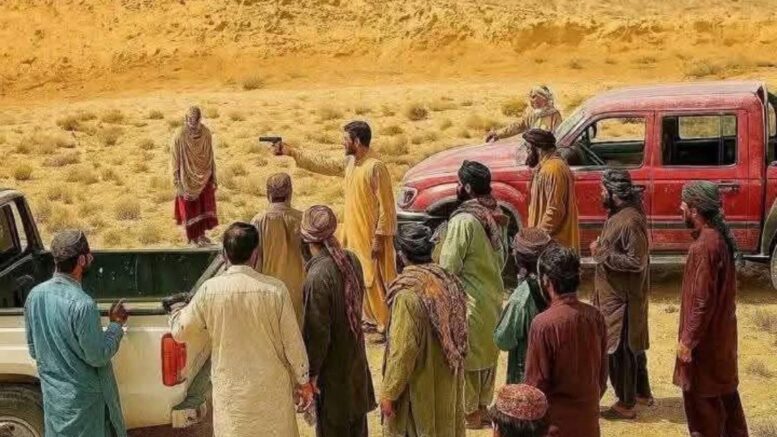By Syed Talat A. Shah.
A tragedy unfolded in Degari, near Quetta, that claimed not only two lives but also cast a shadow over the futures of five children, two families, and two tribes. While the incident is now circulating on social media, its roots are a month old, deeply embedded, and profoundly painful.
A forty-year-old woman, mother of five children (the eldest being seventeen), belonged to the Sattakzai tribe. She had married within the tribe and resided in Degari with her husband. Two years ago, a relationship developed between her and a man from the neighboring Smalani tribe. The woman left not only her husband but also her children to elope with him, and they subsequently married.
This act became a stain not merely on one household, but on the entire tribe’s honor, customs, and history. Time passed, but the silences left behind screamed out relentlessly. Two years later, contact was re-established between the woman and her former family. She was persuaded to return. Under the leadership of tribal elders (sardars), a decision was made: if the woman wished to return to her husband, she would be forgiven and accepted. A fine would be imposed on the Smalani man according to tribal custom, settling the matter. Everything was to be handled discreetly, confined to only a few individuals.
However, the human heart often defies law and verdict, especially when love or ego is involved. The Smalani man could not forget the woman. He began repeatedly visiting her home, insisting on taking her back. This situation escalated in the days leading up to Eid ul-Adha 2025. Provocations, challenges, and emotional manipulation persisted until one day, the woman’s relatives apprehended the man. The woman, who was in Quetta at the time, was also summoned back. Then, both were shot dead. Tribal justice was enacted once more – the sentence of ‘Siyah Kari”: death.
The incident is now visible on social media: viral videos, analyses, comments, and hate-filled remarks. But the question remains: Where was the media at the moment this occurred? Where were the authorities? Where were all those now filling their posts with this tragedy? The reality is that both families had silently agreed to the resolution. There was no police case, no formal tribal dispute. Because in such cases, truth, dignity, honor, and tribal traditions are often buried together in a single grave.
This is not an isolated case. There are thousands of such incidents in Balochistan that never get reported. They never reach a courtroom, nor is anyone officially labeled a criminal. If a woman marries of her own choice, her fate is often death. But the story isn’t always this grim. We have witnessed many marriages where women chose their partners, informed their parents, dialogue ensued, and lives moved forward without a bloody end.
The problem arises where ego, power, honor, and unchecked emotions override law and humanity. It is unjust to view every Baloch through the same lens. Every society has both positive and negative characters. Oppression in one place does not apply to all. The truth is, this incident is not merely about one woman or man; it concerns the futures of two tribes, five children, and generations to come. This is a moment demanding not journalists, but humanity.
Yet, regrettably, we have sanctified social media to such an extent that adorning our posts with someone’s corpse is considered a point of pride. Without investigation, verification, or careful thought, we share images. We appoint ourselves judges, pronouncing verdicts between killer and victim. We fail to realize that a single click, post, or share can shatter a heart, a family, or lineages.
A court can only punish a criminal if there is a complainant. Here, there is no complainant, nor will there be. This silence is the loudest scream. We must hear this scream and understand its roots. We need changes in the laws; we need to eliminate the conditions that breed such tragedies. Not merely viralize the grief for fleeting emotional relief.
This is a time for empathy and reform. Otherwise, such stories, such silent graves, and such nameless killings will continue to become part of history… and we, merely spectators.



Be the first to comment on "Degari’s Bloody Verdict: Love, Honor, Tribal Justice, and Silent Graves"